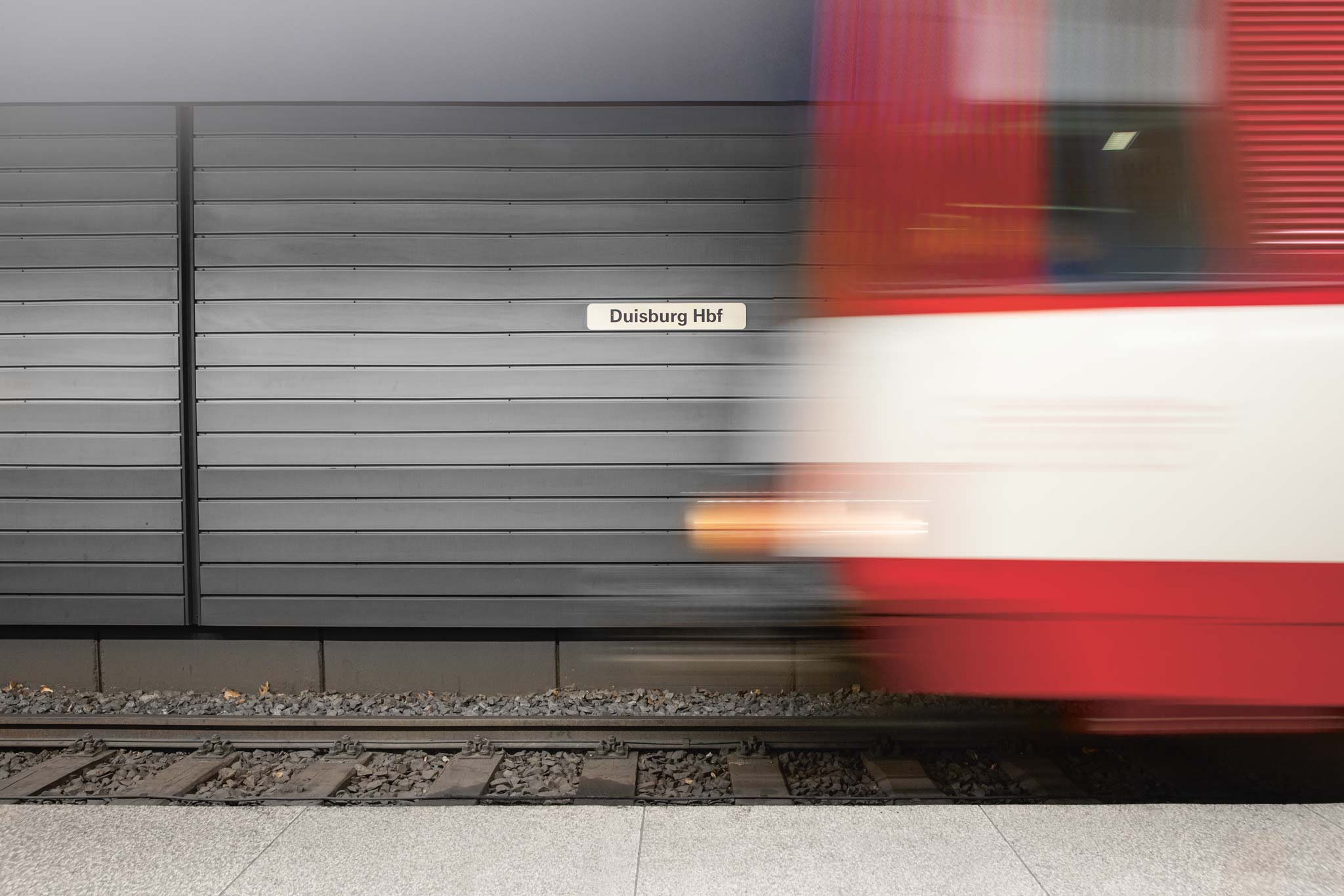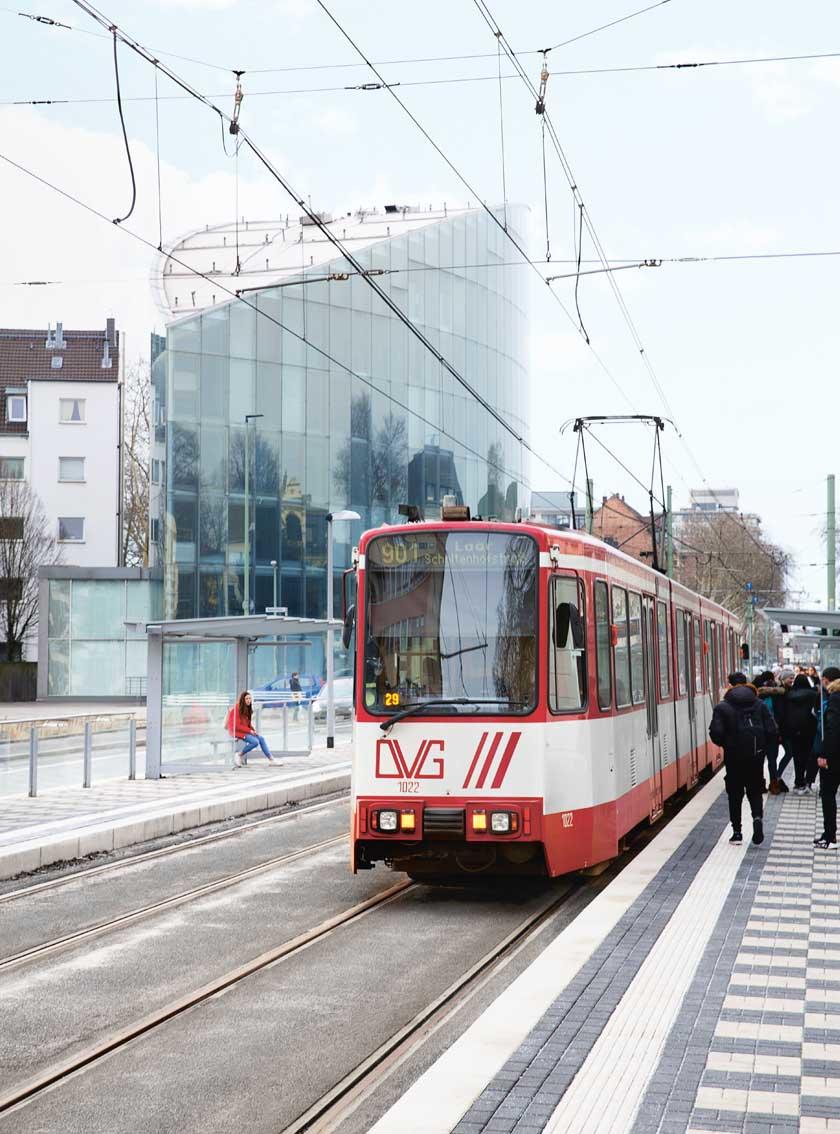Track clear for new transactions
Topics
Tram line 903 is the obvious choice for travellers making their way from Duisburg central station to the headquarters of city public transport company DVG. It is early afternoon. The vocational college students are making their way home, young parents with buggies are out and about and some people on the early shift have already finished work, so the tram, which leaves something to be desired in terms of travelling comfort, is fairly full. The heating system blasts away, roasting anyone able to find a seat, but the ferocious draught through the carriage ensures those left standing feel precious little of the warmth produced. Loudspeakers crackle into life to announce the next stop, but the words are difficult to decipher and no other source of information is provided. Narrow aisles and doorways make negotiating a path around buggies, folding bikes and wheelchairs a slow and awkward process for anyone boarding or leaving. Even a short journey in one of these 30-year-old vehicles should be enough to banish any doubts as to the urgency of Duisburg's need for new trams.
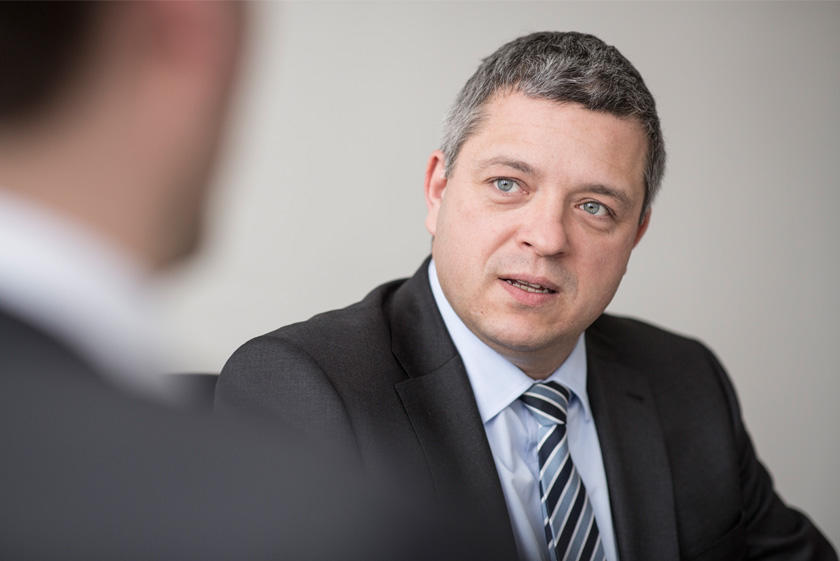
“Accessibility, digitalisation, safety, reliability, convenience and comfort: the purchase of modern new trams marks a milestone for local public transport in Duisburg.”
Marcus Wittig,
Chairman, DVG
47 trams, € 135 million
The good news for the tram users of Duisburg is that things are starting to move: a new fleet of trams has already been ordered and two prototypes should be on the tracks by no later than the beginning of 2020. Delivery of the main fleet, which will eventually consist of 47 new trams developed by manufacturer Bombardier, will commence in 2021. The new vehicles, which are open and accessible, provide more space for passengers. They have an effective heating and cooling system to keep temperatures comfortable in winter and summer alike, plus large display screens presenting relevant information about stops and where to change lines. They will be much easier and more pleasant to use than the models they are to replace, in other words. Not surprisingly, DVG boss Marcus Wittig is very happy with the acquisition: "This purchase marks a milestone for local public transport in Duisburg." Approximately 63 million people use the local public transport system at the moment, but Wittig expects to be welcoming even more passengers soon. "By leaving the car at home, people are not only helping to reduce congestion on our roads, but also taking a significant step to improve air quality in Duisburg."
The new trams are costing DVG around € 135 million, which represents close to a tenth of the city's municipal budget, so this is no trivial investment for DVG. The company has though found a good partner to provide the necessary finance. Why Helaba? "It is important to have a partner we trust and can rely on, of course, but it is the innovativeness of the financing model that we really value," explains Marcus Wittig.
“The first response of most bankers running a rule over the books of a municipal public transport corporation would be to run for the hills.”
Thomas Brauers,
Strategic Financial Management, DVG
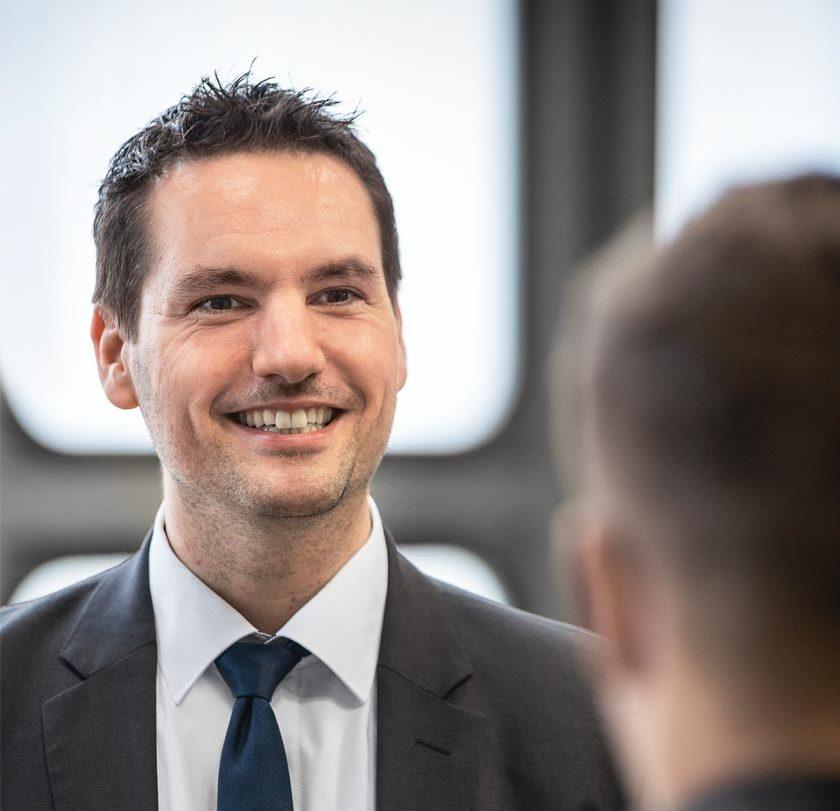
Bankers breaking new ground
Helaba's arrangement to finance new trams for Duisburg breaks new ground in this business area. Christoph Wolff at Helaba's Public Authorities unit initiated the deal. Changing perspectives was a big part of his job in relation to the transaction. "Look at the proposed investment through the usual commercial prism and it is impossible not to notice the glaring imbalance: local public transport is a chronically loss-making business," Wolff states. This is primarily down to factors linked with social and environmental policy: tickets need to be affordable for as many people as possible, but local public transport must also be attractive enough to tempt people out of the car. Achieving both of these things and making money at the same time is unrealistic and everyone understands that. "The first response of most bankers running a rule over the books of a municipal public transport corporation would be to run for the hills," concedes Thomas Brauers, head of Strategic Financial Management at DVG. This explains why city public transport corporations have generally tended to use municipal indemnity bonds to finance new vehicles. Now, however, Helaba has brought its wide-ranging expertise to bear to devise a solution that enables DVG to finance its new fleet independently and put the unusual transaction on a sound footing. Why is this particular deal so attractive?
Christoph Wolff and Thomas Brauers look at each other and smile. The two financial experts know that explaining this means sharing an insight into a tremendously complex system. "The City of Duisburg has an obligation to provide local public transport. And it has transferred this responsibility to DVG," says Thomas Brauers. The municipal energy companies commonly operated by German municipal authorities are usually profitable – and their profits are subject to tax. Municipal authorities can, however, offset these pre-tax profits against their losses from local public transport operations to strengthen their balance sheet and this is the model adopted in Duisburg by combined energy and public transport company DVV.

“Look at the proposed investment through the usual commercial prism and it is impossible not to notice that local public transport is a chronically loss-making business. Thanks to our thorough forensic analysis, however, we were able to develop a model that keeps our interests protected.”
Christoph Wolff,
Helaba Public Authorities
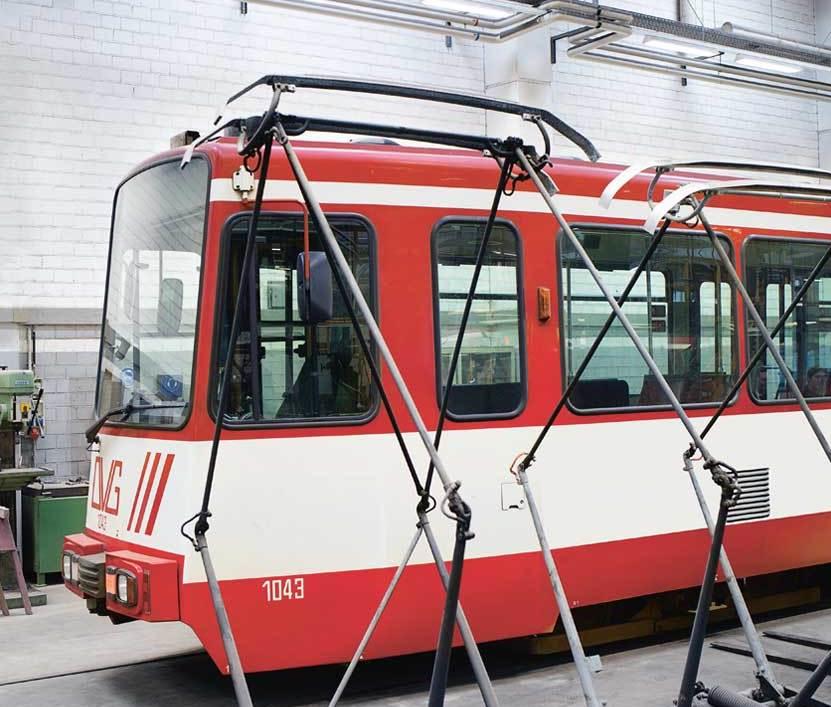
A system with multiple safety nets
The prospect of a strong energy utility and a local public transport company together under one roof is a much more confidence-inspiring prospect for lenders. Expert Christoph Wolff understands though that healthy scepticism is one of the core competencies of a risk manager. Knowing as he does the rules and regulations applied by the lending department to assess the credit standing of potential customers, he studied the key questions very carefully well in advance: if the municipal energy utility weakens and can no longer cover its losses, will the city public transport corporation still be able to hold its ground or will it begin to wobble? "Finding the answer meant exploring what other anchors the system had to offer," recalls Wolff, adding that he and his team spent many weeks wading through the complicated legal structure of local public transport. "We sat there in front of a mountain of laws and regulations that had to be read and digested in all their details," Wolff says with a smile. EU directives on public procurement, the German Passenger Transportation Act, the local public transport law of the State of North Rhine-Westphalia, the structure of the integrated public transport system, the special features of the Duisburg scenario – "We were aiming high: we wanted to make it clear even to people who are used to doing most of their thinking in numbers that this local public transport system is viable in and of itself. The various strands are interwoven in such a way that there are safety nets in place for all eventualities."
Wolff and his team did not content themselves merely with a perfunctory look at a few pieces of legislation. "Our job was to read all of the relevant provisions and develop a thorough understanding of them and their combined effect. We went back to our sparring partners at DVG to double-check our conclusions and make sure we hadn't misunderstood anything." This approach spawned innovative solutions including what is referred to as the winding-up model: "We were taking the final loan decision through at a time of transition," Wolff explains. DVG's existing mandate from the City of Duisburg to organise local public transport in the area had only two more years to run and the new mandate expected to come into force from January 2020 was not yet legally binding. "But this mandate forms the crucial legal basis for DVG's business," Wolff continues. "So what happens if DVG is for some reason unable to continue providing the tram service in Duisburg during the lifetime of the new mandate – however unlikely that scenario may seem from today's perspective? The expensive new trams would be left standing in the sidings." The trams, it should be noted, could not just be moved straight to other cities for technical reasons. Wolff and his team decided to resolve this potential stumbling block by developing a model under which DVG would be able to service its loans even if the scenario described were to be realised. The key, in essence, was to create a structure in which DVV, the combined energy utility/public transport operator, had the right to sell the trams to the City of Duisburg and the City had a duty to accept and pay for them. The corresponding legal arrangements had of course to be implemented in compliance with German law on state supervision of local authorities and EU subsidy law.
63 million
Evidence assembled, time to present the case
Having developed this new expertise, Helaba is now actively seeking business opportunities with other municipal public transport corporations. "Helaba has already been able to seal two more new deals following on from Duisburg," Wolff reports, tempering his obvious enthusiasm with the observation that financing local public transport is never going to be a huge business area. "The circumstances are different in every city and every federal state, but on the other hand, financing buses and rail vehicles is still a relatively straightforward notion to put across because vehicles are real, tangible things." Cities though are increasingly going to need to start investing not just in vehicles but in their local public transport infrastructure – in track, tunnels and platforms. "How to make these transactions work and how to win the necessary people over to the idea are tasks we have still to tackle." But Christoph Wolff is certainly not afraid of the challenge; in fact, he positively relishes the prospect.

Further selected projects
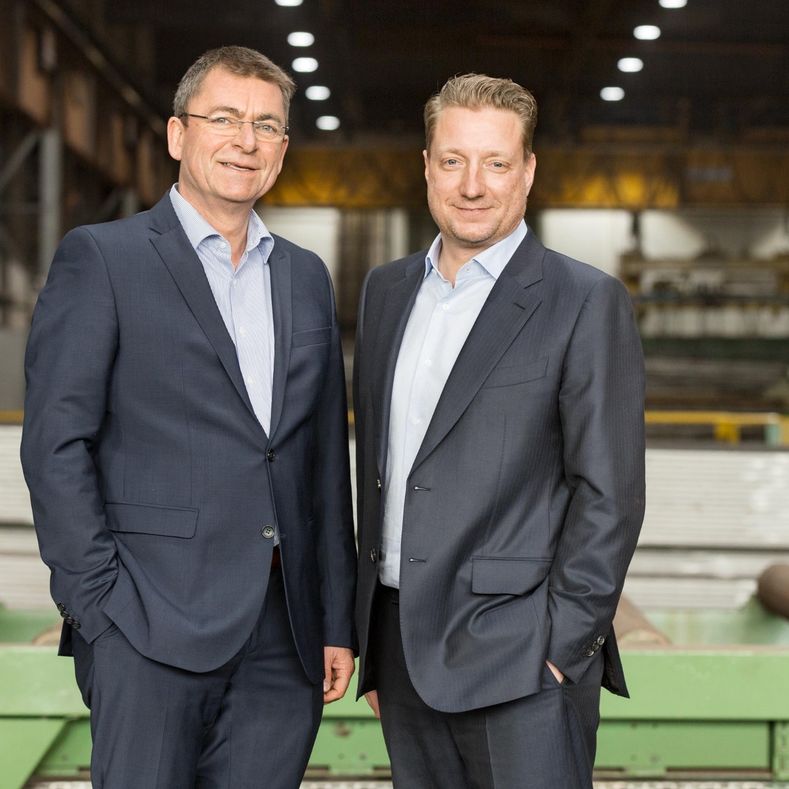 A family-oriented champion
A family-oriented championA family-oriented champion
Family-owned steel pipe solutions specialist EEW Group has quietly grown to international market leader in the space of three generations.

